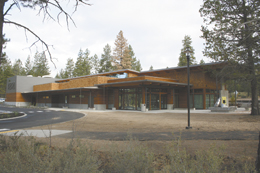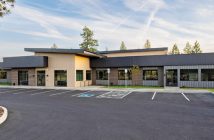New State of Art Jungers Center Leads Way in Education & Sustainability
 A new state-of-the-art culinary arts teaching facility touted as “Best in the West” is positioning Central Oregon Community College’s Cascade Culinary Institute to lead the next wave in Pacific Northwest cuisine.
A new state-of-the-art culinary arts teaching facility touted as “Best in the West” is positioning Central Oregon Community College’s Cascade Culinary Institute to lead the next wave in Pacific Northwest cuisine.
The recently unveiled 15,000 square foot Jungers Culinary Center brings together the latest kitchen classroom technology, multiple cooking labs, a demonstration theater and a 60-seat restaurant – complete with indoor and outdoor amenities – where local diners will get a first-hand taste of students’ skills as they hone them.
The new building, named in honor of major endowment fund donors Frank and Julie Jungers, is also anchoring the first phase of the “Campus Village” mixed use development – planned to feature commercial, residential and educational space on COCC acreage off NW Shevlin Park Road and Mt. Washington Drive, in a partnership with Old Mill District pioneer William Smith Properties.
The Jungers Center design style will also set the tone for the rest of the project in terms of the aesthetic template.
CCI and its architectural team also designed the facility with an eye on energy savings as part of a commercial green building certification pilot program overseen by the Earth Advantage Institute (see sidebar) with efficiencies and sustainable principles built into its construction and equipment aiming to qualify for Gold Level EA Commercial accreditation.
COCC has operated Cascade Culinary Institute, formerly based in the Grandview building, for some 18 years, but the new facility will allow for a major program expansion and a substantial increase in enrolment capacity to meet today’s challenging restaurant industry demands.
Director and Executive Chef Gene Fritz, who was formerly founding director of education at Seattle’s Le Cordon Bleu College of Culinary Arts, said CCI will build on its mission of providing rigorous training for those passionate about successful careers in culinary arts, with accredited degree programs producing graduates who demonstrate mastery in food preparation, understand all facets of food service operations, and are eager to innovate in the kitchen.
He said: “We are also looking to increase collaboration with regional industry organizations, and increase service of CCI to the community at large through educational programs and community service.
“This fantastic new facility gives us even greater tools to provide the community with learning outcomes that the industry needs and to gain experience in not only cooking the finest cuisine but in all facets of restaurant management. We’re trying to listen to the industry, respond to their needs and make sure we’re current, and can provide a unique opportunity for ‘hands-on’ training in building skill sets.”
One of the Institute’s major focuses is to engage with an advisory board and local industry to see what is needed in the workforce, so that it can prepare students to meet that need and obtain jobs.
CCI, which features programs sanctioned by the American Culinary Federation, was already producing a steady stream of exponents, but not enough to meet growing regional demand.
In recognition of that fact, several years ago the vision was formed to expand and aim to be recognized in the Pacific Northwest as the leader in culinary education, producing talent competitive with chefs graduating from the finest schools in the country to train the next great restaurant owners, managers and chefs.
A $1 million donation from the Jungers kicked off the COCC Foundation Culinary Campaign, and the final fundraising target was hit through donors (honored in the new building’s lobby) and college matching funds.
The flagship new school looks to boost CCI’s success in producing innovators with practical competitive skills who are ready to lead in the kitchen based on factors such as hands-on training from top faculty, a state of art teaching environment, a commitment to sustainability and a collaborative approach to learning.
Fritz added, “Students are encouraged to take ownership of the learning process and bring their own ideas to the kitchen classroom.
“When this spirit of inquiry is fostered and combined with rigorous instruction, positive mentoring, regular assessment, and required benchmarks, trainees are well prepared for food service careers.
“Our students gain not only cooking techniques that employers require, but instinct about what works in the kitchen – and the confidence to succeed in their chosen career pathway.”
The Jungers building centerpiece school is fully wired and, as well as demonstrating a commitment to sustainability, leverages the latest technology to transform the teaching of cooking.
Highlights of the facility, which included Yost Grube Hall of Portland and Bend’s Pinnacle Architecture on the design team and HSW Builders as general contractor, include:
• Fifty-seat “Food Network”- style demonstration theater with high-def TV, wirelessly operated cameras and a mobile cook station
• Three kitchen classrooms (including foundations skills and advanced level) with ratio of 1.5 energy-efficient induction burners per student
• Baking and pastry lab with steam-injected deck ovens
• Wireless point-of-sale system in the teaching restaurant
• Culinary resource library with computer stations and wireless access
• Radiant floor heating and infrared heat detectors to monitor/control indoor climate and kitchen hood operational efficiency
• Tank-free, on-demand water heaters for energy efficiency
• High performance premier Structural Insulated Panels (SIPS) for roof framing, with high thermal value, strength and environ-
mental benefits
• Use of locally-sourced and recycled materials
• Solar panels.
Another ground-breaking advance is “Elevation” – CCI’s community dining center or teaching restaurant, which adjoins the exhibition kitchen and provides students real-world lessons in creating a positive dining experience.
Hands-free headsets and video monitors with an alert system allow culinary students to communicate with the front of the house professionally, as they learn to judge cook times for orders and practice what they’ve learned in class. Once integrated, at scheduled opening times for the public, patrons will be actively engaged with an opportunity to provide feedback on their dining experience that directly contributes to the learning process.
As well as teaching mastery of the core competencies of hot and cold food preparation and specialty skills, such as baking and pastry, comprehensive instruction will also be continued in the equally critical understanding of the business side of food service – in areas such as purchasing and storeroom inventory controls – so that students may gain a fully-rounded experience and be equipped to show professionalism throughout restaurant operations.
In addition to accredited certifications and degrees, the Institute also provides professional development coursework, casual cooking classes, hosts cooking competitions and participates in fundraisers to alleviate hunger in Central Oregon. The demo theater hi-tech capability will also allow live streaming capability throughout the building, and the potential for further outreach to high school classes.
As well as sustainability in construction, the Jungers Center and CCI teaching restaurant is committed to the sustainably-produced, fresh foods and principles of the “Eat Local” movement, including locally sourced and organic meats, drink and produce. Non-toxics are also used for cleaning.
Chef Fritz added, “We encourage students towards a more green approach to cooking, and to that end we are ensuring a solid compost program and recycling. There will be more green in the equipment and in the learning experience as well.
“Everything learned in the curriculum can be put to the test in the restaurant, and our overall aim is to meet today’s industry demands, prepare our graduates for success and be the top regional choice for culinary students.”
COCC President Jim Middleton, who was one of the original drivers leading to the fulfillment of an expanded culinary center vision, said, “The tremendous growth in the restaurant industry gives us not only the opportunity, but also the obligation to respond.
“We need to help meet their challenges by increasing the length of our program and upgrading the skills of our graduates.
“This wonderful new facility is also more visible and accessible, and allows us to use our existing campus buildings more efficiently for our other instruction programs.”
Cascade Culinary Institute, 2555 NW Campus Village Way, 1-877-541-CHEF; info@cascadeculinary.com.




